新概念一L74
新概念第一册Lesson 74知识要点总结

新概念第一册L74复习要点一.句子学习:1.He shaved hurriedly this morning and cut himself badly.他匆忙地刮了胡子,把自己弄伤了。
2.He took a cake and ate quickly.他拿了个蛋糕,快速地吃掉了。
3.I gave him a glass of water and he drank thirstily.我给了他一杯水,他很渴地喝掉了。
4.I met her in the street the day before yesterday and she greetedme warmly.前天我在街上遇见了她,她很热情地跟我打了招呼。
5.The bus went slowly yesterday afternoon and we arrived homelate.昨天下午巴士走得很慢,我们到家晚了。
6.They worked very hard this morning.今天上午他们工作得很努力。
7.We enjoyed ourselves very much last night.昨天晚上我们玩得非常开心。
8.He swam very well this afternoon.今天下午他游得非常好。
二.形容词与副词1.形容词后加ly变为副词Slow----slowly quick----quickly bad----badlySudden----suddenly careful----carefully beautiful----beautifully Warm----warmly cold----coldly sad----sadly2.以y结尾的形容词变y为ilyHappy----happily hungry-----hungrilyThirsty----thirstily lazy----lazilyAngry----angrily3.可以用作形容词也可以用作副词:Early late hard fast high注意:其中有些词还可以加ly变成新的副词Late----latelyYou are late.你迟到了。
新概念英语第一册第73-74课-The way to King
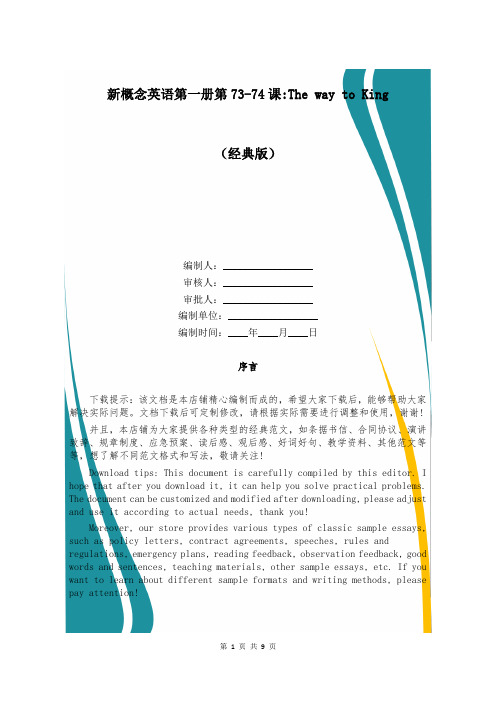
新概念英语第一册第73-74课:The way to King(经典版)编制人:__________________审核人:__________________审批人:__________________编制单位:__________________编制时间:____年____月____日序言下载提示:该文档是本店铺精心编制而成的,希望大家下载后,能够帮助大家解决实际问题。
文档下载后可定制修改,请根据实际需要进行调整和使用,谢谢!并且,本店铺为大家提供各种类型的经典范文,如条据书信、合同协议、演讲致辞、规章制度、应急预案、读后感、观后感、好词好句、教学资料、其他范文等等,想了解不同范文格式和写法,敬请关注!Download tips: This document is carefully compiled by this editor. I hope that after you download it, it can help you solve practical problems. The document can be customized and modified after downloading, please adjust and use it according to actual needs, thank you!Moreover, our store provides various types of classic sample essays, such as policy letters, contract agreements, speeches, rules and regulations, emergency plans, reading feedback, observation feedback, good words and sentences, teaching materials, other sample essays, etc. If you want to learn about different sample formats and writing methods, please pay attention!新概念英语第一册第73-74课:The way to King新概念英语第一册第73-74课:The way to King StreetLesson 73 The way to King Street到国王街的走法Listen to the tape then answer this question。
lesson 74新概念一

He shaved hurriedly this morning and cut himself badly.
He took a cake and ate it quickly.
I gave him a glass of water and he drank it thirstily.
• • • • • • • • •
副词用来修饰动词,形容词或者全句。 He can draw well. The door opened suddenly. 一般情况下形容词加ly变副词: real-really quick-quickly slow-slowly quiet---quietly 辅音字母加y结尾的单词变y为i加ly easy---easily angry---angrily busy---busily happy---happily
A flower potห้องสมุดไป่ตู้fell on the man’s head.
A thief broke into our house last summer.
An accident
I saw a car crash this morning. A man in a small red sports car was driving down Park street very fast. When he was driving he was talking on his mobile phone. At the same time, a woman in a large green truck was driving along Kelly street very slowly. When she was driving, she was drinking a cup of coffee and eating a cake.
新概念英语第一册73-74课课文详解、翻译及语法
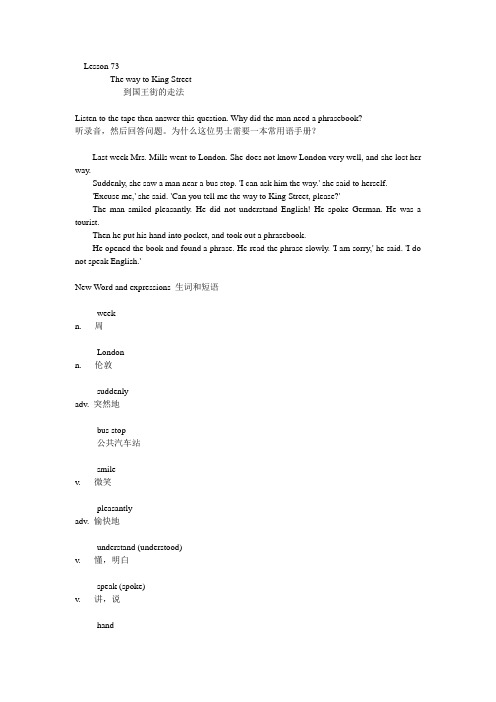
Lesson 73The way to King Street到国王街的走法Listen to the tape then answer this question. Why did the man need a phrasebook?听录音,然后回答问题。
为什么这位男士需要一本常用语手册?Last week Mrs. Mills went to London. She does not know London very well, and she lost her way.Suddenly, she saw a man near a bus stop. 'I can ask him the way.' she said to herself.'Excuse me,' she said. 'Can you tell me the way to King Street, please?'The man smiled pleasantly. He did not understand English! He spoke German. He was a tourist.Then he put his hand into pocket, and took out a phrasebook.He opened the book and found a phrase. He read the phrase slowly. 'I am sorry,' he said. 'I do not speak English.'New Word and expressions 生词和短语weekn. 周Londonn. 伦敦suddenlyadv. 突然地bus stop公共汽车站smilev. 微笑pleasantlyadv. 愉快地understand (understood)v. 懂,明白speak (spoke)v. 讲,说handn. 手pocketn. 衣袋phrasebookn. 短语手册,常用语手册phrasen. 短语slowlyadv. 缓慢地参考译文上星期米尔斯夫人去了伦敦。
新概念一册L73-74课课件
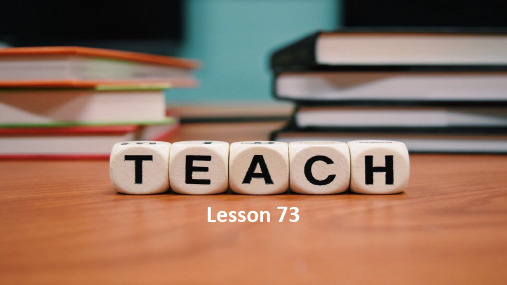
put v. 放….(过去式 put) put......into 放进
take out 拿出 (take 的过去式 took)
5. Then he put his hand into his pocket, and took out a phrasebook.
2. Suddenly, she saw a man near a bus-stop. “ I can ask him the way.” She said to herself.
1.suddenly/ 'sʌdnlɪ / adv. 突然地=All of a sudden 2.see “看” (saw 过去式)see sb. do/doing sth. 3.herself (人称代词宾格her的反身代词) 4.say(said过去式) to oneself 心中暗想
4. The man smiled pleasantly. He did not understand English! He spoke German. He was a tourist.
smile v. 微笑 understand v. 懂,明白,理解 speak / spik / v. 讲,说 【speak +语言】
eg.It's hard to understand this book. 这本书很难懂。 eg.I don’t understand Italian.
understood (understand的过去式) eg.My grandmother understood Russian when she was young. 我的奶奶年轻的时候懂俄语。
新概念英语第一册L74
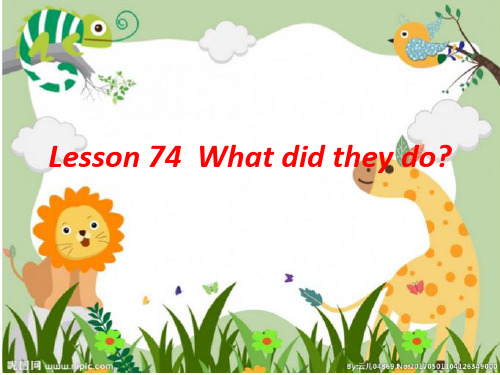
She greeted me warmly.
Why did you both arrive home late?
Because the bus wபைடு நூலகம்nt slowly.
Why did you both arrive home late?
Because the bus went slowly.
What did the keyboard operators
evening
night
today
this morning this afternoon this evening tonight
yesterday
yesterday morning yesterday afternoon yesterday evening last night
the day before yesterday the day before yesterday in the morning the day before yesterday in the afternoon the day before yesterday in the evening the night before last
Lesson 74 What did they do?
Sunday
the day before yesterday morning afternoon evening night
Monday
yesterday
Tuesday
today morning afternoon
evening night
morning afternoon
When did you go to London? I went to London …?
新概念英语第1册第73-74课重点语法

新概念英语第1册第73-74课重点语法第73-74课的内容:一、重要句型或语法1、一般过去时表示过去发生的而现在已经结束的动作或状态。
本课主要学习的是动词的过去式的不规则变化,如:went, lost, saw, said, did, spoke, put, took, found, read。
2、副词本课侧重的是“形容词+-ly”构成副词的用法,如:suddenly, pleasantly, slowly。
二、课文主要语言点Last week Mrs. Mills went to London. 1)last用来表示过去的时间,但考虑到在第75课里会重点学习过去时间的表达,建议本课点到为止。
2)went为go的过去式。
She does not know London very well, and she lost her way.1)and前后两句话用了不同的时态,能够提问学生并分析其中的原因。
2)know...very well,表熟知。
lose one's way,表迷路;注意提醒学生lose的过去式形式。
Suddenly, she saw a man near a bus stop. 1)suddenly是有“sudden(形容词,突然的)+-ly”构成的副词。
2)saw为see的过去式形式。
3)stop一般用来表示公交车站,注意对比station(火车站)和机场(airport)。
I can ask him the way,' she said to herself. 1)ask sb.the way,表示向某人问路。
2)say to oneself,表示自言自语。
said为say的过去式。
Excuse me,' she said. ' Can you tell me the way to King Street, please?' 1)关于引语中的标点符号用法:此处可提醒学生,如果在引语中插入了she said这样的提示语,前面句子的末尾一般都用逗号,除了疑问句和感叹句外。
新概念第一册L73-74

Where are the mice
suddenly
pleasantly
understand
pocket hand London smile slowly understand week
bus stop
★week n. 周 • this week, last week等,前面不能加介词 the week before last 上上周 the week after next 下下周 ★suddenly 我们正通着电话,突然电话断了。 We were talking on the phone when, suddenly, the line went dead. 我突然想起我没有带钥匙。 I suddenly remembered that I didn't bring my key.
★lose v. (使)迷路 ① v. 迷失;(使)迷路 • lose one’s way 迷路 • 在陌生的城市很容易迷路。 It’s very easy to lose your way in a strange city. ② v. 失去;丧失 • 他在一起汽车交通事故中失明了。 He lost his sight in a car accident. • 她由于粗心大意刚刚丢了工作。 She has just lost her job because of carelessness.
一般过去时
基本结构:主语+动词过去式+其他; 否定形式①was/were + not; ②在行为动词前加didn‘t,同时还原行为动 词; 一般疑问句Did+主语do+其他。用法
时态
动词 形式
肯定句 否定句
一般现 一般、 原形/ I do… 在时 经常、 三单 He 习惯、 do/do does… 真理 es
2024年新概念英语NCE1_lesson73-74(共25页)课件
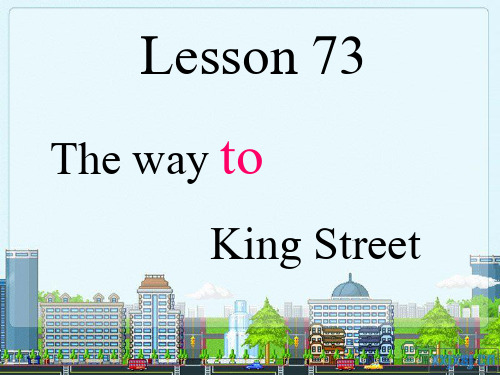
Big Ben
Mrs. Mills
Last week, Mrs. Mills went to London .
doubledecker bus
She does not know London very waneldl,she lost her way.
2.lose (one’s) way
Tom often loses his way. Tom lost his way last week.
3.ask the way
Jenny usually asks the policeman the way. Jenny asked the policeman the way last Sunday.
5.I am sorry, I do not speak English.
4.Can you tell me the way to King Street, please?
6.say to oneself
Listen to the tape then answer this question.
do not speak English.”
Summary
• 短语:1.the way to… 2.go to…
• 3.know sth very well 4.lose one’s way
• 5.bus stop
6.say to oneself:自言自语
• 7. speak +语言
8.take out sth
pleasant adj. 宜人的
请记住这些单词☺
understand /;VndE- 'stQnd/ (understood /;VndE-'stud/ ) v. 懂,明白
新概念第一册Lesson-73-74完整版
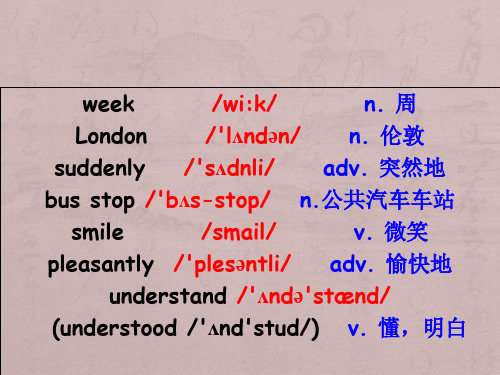
她愉快地笑了。
smile a…smile 微微一笑
The man smiled pleasantly. 这人友好地笑了笑。
★ understand v. 懂,明白 /'ʌndə'stæ nd/(understood )
He opened the book and found a phrase. He read the phrase slowly. 'I am sorry,' he said. 'I do not speak English.'
1.What did Mrs. Mills do last week? She went to London. 2.What happened to her? She lost her way. 3.Why did the man need a
时态用法动词形式肯定句否定句一般疑问句及其回答特殊疑问句及其回答一般现在时一般经常习惯真理原形时态用法动词形式肯定句否定句一般疑问句及其回答特殊疑问句及其回答一般现在时一般经常习惯真理原形三单dodoesidohedoesidontdohedoesntdo
week
/wi:k/
n. 周
London
/'lʌndən/ n. 伦敦
this week, last week, (前面不能加介词)
the week before last 上上周 the week after next 下下周
★ London /'lʌndən/ n. 伦敦 英国的首都
★ suddenly
/'sʌdnli/ adv. 突然地 既可以放在句首, 也可以放在句中或句末。
新概念英语第一册Lesson 73-74 练习题

新概念英语第一册Lesson 73-74 练习题Lesson 73 and Lesson 74Fill in the blanks with the first letter of the given words according to the meaning (10 points)1.Mrs。
Mill does not know London very well and she lost her way.2.Miss Williams is driving to school。
Suddenly her car s.3.Can you tell me the way to King Street。
please?4.He showed us how to get to the post office.5.He was Italian。
He did not understand English.6.He came to England from Germany for a holiday.7.He put his hand into his pocket and took a phrasebook out of the pocket.8.The old man is walking slowly.9.He shaved hurriedly this morning and cut himself badly.10.She knew little about the town.Fill in the blanks with the appropriate forms of the given words (10 points)1.I get him a glass of water and he drank it thirstily.2.Mrs。
Mills does not know London very well.3.The man smiled pleasantly.4.He comes from Germany。
新概念英语第1册单词表-(按字母排列)
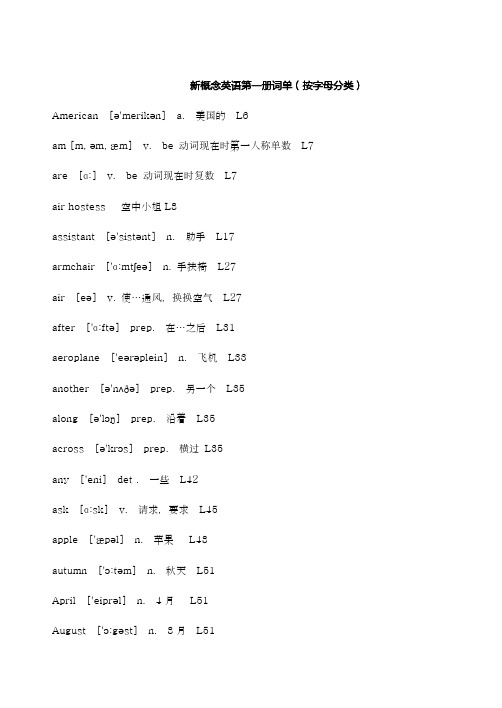
always ['ɔ:lweiz] ad. 总是 L53 Australia [ɔ'streiliə] n. 澳大利亚 L54 Australian [ɔ'streiliən] n. 澳大利亚人 L54 Austria ['ɔstriə] n. 奥地利 L54 Austrian ['ɔstriən] n. 奥地利人 L54 arrive [ə'raiv] v . 到达 L55 afternoon [ˌɑ:ftə'nu:n] n. 下午 L55 aspirin ['æspərin] n. 阿斯匹林 L61 absent ['æbsənt, əb'sent] a. 缺席的 L67 awful ['ɔ:ful] ad. 让人讨厌的,坏的 L71 answer ['ɑ:nsə] v. 接 (电话) L71 again [ə'gein] ad. 又一次地 L71 ago [ə'gəu] ad. 以前 L75 appointment [ə'pɔintmənt] n. 约会,预约 L77 already [ɔ:l'redi] ad. 已经 L83 attendant [ə'tendənt] n. 接待员 L87 Athens ['æθinz] n. 雅典 L94 address [ə'dres] n. 地址 L97 at once [ət 'wʌns] 立即 L99
beside [bi'said] prep. 在…旁 L36 bookcase ['buk-keis] n. 书橱,书架 L37 bread [bred] n. 面包 L41 bird [bə:d] n. 鸟 L42 behind [bi'haind] prep. 在…后面 L43 boil [bɔil] v. 沸腾, 开 L43 boss [bɔs] n. 老板,上司 L45 biscuit ['biskit] n. 饼干 L46 butter ['bʌtə] n. 黄油 L48 banana [bə'nɑ:nə] n. 香蕉 L48 beer [biə] n. 啤酒 L48 blackboard ['blækbɔ:d] n. 黑板 L48 butcher ['butʃə] n. 卖肉的 L49 beef [bi:f] n. 牛肉 L49 bean [bi:n] n. 豆角 L50 Brazil [brə'zil] n. 巴西 L52 best [best] ad. 最 L53 bad [bæd] a. 坏的,严重的 L61 better ['betə] a. 形容词 well 的比较级 L63
新概念一册L73-74ppt课件

put pocket phrasebook.
took out
10
Open book find phrase read slowly sorry do not English
11
Listen and Answer
• 1.What’s missing? • 2.When did she go to London? • 3.Who lost the way? • 4.Did the man understand the way? • 5.Why did the man need a phrasebook? • 6.If you lose your way what will you do ?
规则变化 不规则变化
19
动词过去式
• 一.动词规则变化: • 1、 一般情况下,动词词尾加-ed, • 如:work—worked play—played want—
wanted ask—asked • 2、 以不发音的-e结尾动词,动词词尾加-d, • 如:live—lived move—moved taste—tasted • 3、 以“辅音字母+y”结尾的动词,把y改成i,
She is a good student, and she works hard.
25
形容词变副词
• 1.一般情况下在形容词词尾直接加-ly。 • 如:real-really; helpful-helpfully; • careful-carefully; hopeful-hopefully; • slow-slowly; quick-quickly; • quiet-quietly ;quick---quickly • 2. 以辅音字母加y结尾的形容词要变y为i,然后再加-ly。 • 如:busy-busily; • angry-angrily; • easy-easily ; • happy---happily
新概念第一册lesson73-74知识点
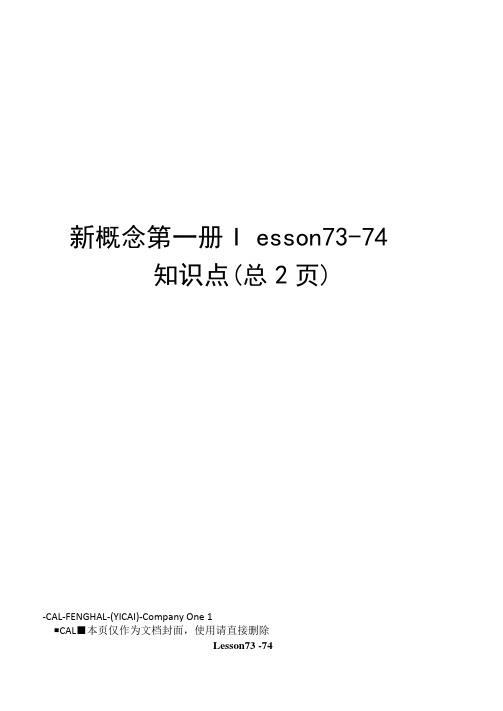
新概念第一册I esson73-74知识点(总2页)-CAL-FENGHAL-(YICAI)-Company One 1■CAL■本页仅作为文档封面,使用请直接删除Lesson73 -74词汇:week [wi:k] n.周last week 上周/ next week 下周/this week 这周weekend [wiik^nd] n.周末at the weekend 在周末know [nsu] v. 了解;熟悉;知道;认识;懂得know-knew-known know of知道(有) .................... 听说过...I know of him, but I don't know him.know one's job 在行,懂行be known as被称为be known to all众所周知well [wel] n.井adj.良好的;健康的adv.很好地There is a well over there・She is well.She study well./My mom cooks well.lose [lu:z] v.失去,丢失;迷路;失败,输lose-lost-lostlose one's patience/reason (理山:理性)/nerve /balance/sleep/face/way 失去耐心/失去理智/失去勇气/失去平衡,跌倒/失眠/丢脸/迷路suddenly CsAdanh] adv.突然地;忽然地She stood up suddenly. stand-stood-stoodsmile [small] vi.微笑n.微笑;笑容smile-smiled-smiledsmile at朝... 微笑She wears a smile on her face everydayunderstand [Ands^taend] v.理解;懂得;明tl understand-understood-understood I don't understand, can you explain it againhand [hsend] n.手;帮助;指针v.递给,提交at hand在手边,在附近/by hand用手/hand in hand手拉手,携手hand in交上,上交/ hand down传下来,传给on one hand ...... on the other hand —方面,另一方面put ...... into 把 ... 放进put-put-puttake........ o ut 把 .. 取岀take-took-takenphrase [freiz] n.短语,习语a noun phrase名词短语cut [kAt] Vt.切,害I」;剪cut-cut-cutcut one"s hairgreet [gri:t]vt.问候,打招呼;致敬,致意greet-greeted-greetedgreeting n•问Hl矣greet sb问候某人,向某人打招呼语法:adv副词的用法(1) do (sth) + adv⑵ adj+ advsuddenly (突然地)/pleasantly (愉快地)/slowly (缓慢地)/hurriedly (急忙地)/badly(严重地;非常地)/thirstily (渴望地,口渴地)/quicklyf快速地)/warmly (热情地)动词原形••过去分词■现在分词do-did-donego-we nt・gonesee-saw-see nask-asked-askedsay-said-saidspeak-spoke-spoke n be-was/were-bee n open-opened-opened fin d-fou ncbfound read [ri:d]-read [red]- read [red] eat-ate-eaten give-gave-given drink-dra nk-drunk meet-met-met arrive-arrived-arrived work-worked-worked enjoy-enjoyed-enj oye d swim-swam-swu m shave-shaved-shaved一般现在时和一般过去时的区别公式:sb do sthsb did sthsee和watch的区别see表示结果,看到看见watch表示看的过程,观看,注视He watched the photo but can not saw his dog ・课文句型:ask sb sth/ask sb (not) to do sth询问某人某事/要求某人做某事Can you ask the teacher her birthdayMy father asked me to bring a book to him yesterday・tell sb sth/tell sb (not) to do sth告诉某人某事/建议,命令某人做某事My brother tells me his school lifeMy uncle tells me to do my homework right now・。
新概念第一册L73-74最详细课件

伦敦2012年奥运会游泳馆
伦敦2012年奥运会主体育馆
How much do you know about London? 别名: 雾都 行政区类别: 英国首都 所属地区: 大不列颠及北爱尔兰联合王国 面积: 1,577.3平方公里(大伦敦) 人口: 751.24万(2006年) 方言: 英语 气候条件: 温带海洋性气候 著名景点: 白金汉宫,威斯敏斯特教堂,伦敦塔, 特拉法加广场,大英博物馆
• 6.Where's my watch? I can't______it. • A, look for B, find C, find out D, look • 7.My father ______his hand into the bag, and _____out a story book. • A, putted; taked B, put; take C, put; took D, putting; taking • 8.The waiter smiled______and showed me the menu. • A, pleasantly B, friendly C, pleasant D, friend • 9.It suddenly started to rain. We rain into the house___. • A, hurry B, hurried C, hurriedly D, in hurry • 10.John can speak English_______. • A, very welly B, very goodly C, very good D, very well
104
新概念一L73-74

1.Where did he go last week ? He went to London .
2.Did she know it very well ?
No,she didn’t
3:Why did the man need a phrasebo Because he didn’t know English.
(冲...微笑) (近距离) The girl is smiling to me.
(对...微笑)(远距离)
V+pleasantly
adj: pleasant : pleasant climate a smiling girl (一个微笑的女孩)
(adj:微笑的) laugh (大笑)(v)
Don't laugh at me. (不要嘲笑我!) I want to have a good laugh.
lose
1)know sb/ sw very well
(非常了解某人/某地)
2)lose one’s way (迷路) 奶奶对北海不是很了解,因此她
常迷路。
My grandma doesn’t know Beihai very well,so she often loses her way.
奶奶刚才迷路了:
say to sb talk to /with sb
Can you ____ it in English ?
Can you _____ in English ?
Can you ____ with your teacher in English ?
6.hands n. eg.饭前要洗手: You must wash your hands before a meal.
- 1、下载文档前请自行甄别文档内容的完整性,平台不提供额外的编辑、内容补充、找答案等附加服务。
- 2、"仅部分预览"的文档,不可在线预览部分如存在完整性等问题,可反馈申请退款(可完整预览的文档不适用该条件!)。
- 3、如文档侵犯您的权益,请联系客服反馈,我们会尽快为您处理(人工客服工作时间:9:00-18:30)。
不规则动词的过去式 • • • • • • • cut do drink find give go lose • • • • • • • cut did drank found gave went lost
不规则动词的过去式
• • • • • • • • meet read say see speak swim take understand • • • • • • • • met read said saw spoke swam took understood
• 1. The man ____(speak) very slowly, but I didn’t understand him. • 2.The tourist ____(lose) his way in Hong Kong. • 3.My friend ____(meet) me at the railway station. • 4.Jill’s father _____(give) her the key to the front door. • 5.Mrs.Hills ____(is) in London last week. • 6.She ____(go) to Paris last year . • 7.The man _____(drink) their tea very quickly. • 8.We ____(see) our friends at the bus stop. • 9. The students______ (understand) me because I spoke very slowly and carefully. • 10. The boy _______(find) some money and _____(take) it to his teacher.
Look at picture 106 . What did the keyboard operators do this morning ? They worked very hard .
• They worked very hard this morning.
Look at picture 107 . How did you enjoy yourselves last night ? We enjoyed ourselves very much.
模仿句子
She smiled . She was pleasant. -------She smiled pleasantly. 1. He spoke .He was quick. 2. She writes English. She's careful. 3. They arrived . They were late. 4. He looked at me . He was angry. 5. He cut himself. It was bad. 6. I worked in the office. It was hard. 7. He speak English. His English is very good.
greet 打招呼,问候
hurriedly adv. 匆忙地 thirst n.口渴 thirsty adj 口渴的 thirstily adv 口渴地 cut 切 ,割(cut) go v. 走 go--went greet 打招呼,问候
听力: Look at picture 101 . Why did he cut himself this morning? Because he shaved hurriedly .
Lesson 74 What did they do? 他们干了什么?
hurriedly adv. 匆忙地
• thirst n.口渴 • thirsty adj 口渴的 • thirstily adv 口渴地
cut 切 ,割(cut)
go v. 走 go--went
go along 前进
go away 走开,带走
• I gave him a glass of water and he drank it thirstily
.
• I met her in the street the day before yesterday and she greeted me warmly.
greet sb.向某人打招呼 Look at picture 104 . When did you meet her ? I met her the day before yesterday . How did she greet you? She greeted me warmly .
• He took a cake and ate it quickly.
Look at picture 103 . What did you give him ? I gave him a glass of water . What did he do with it? He drank it thirstily .
• 11. We _____(swim) in the sea yesterday. • 12. That man ____(do) a very good job for us. • 13. The girl ____(cut) her leg very badly. • 14. I _____(read) the exercise very carefully. • 15. ------Did she speak to you? -------Yes , she _____(say)' Hello’.
1.课后题完成。 2.背动词变过去式 60-75 5+1
We enjoyed ourselves very much last night.
Look at picture 108 . How did he swim this afternoon ? very well . He swam
• He swam well this afternoon.
形容词变副词 • 1.一般情况下在形容词词尾直 接加-ly。如:real-really; helpful-helpfully; carefulcarefully; hopeful-hopefully; slow-slowly; quick-quickly; quiet-quietly ;
• 2. 以辅音字母加y结尾的形容词 要变y为i,然后再加-ly。 如:busy-busily; angry-angrily; easy-easily ;happy---happily
• 3、某些以辅音字母加不发音的 字母e结尾和以-ue结尾的形容 词要先去掉e,然后再加-y或-ly。 如: terrible-terribly; true-truly; gentle-gently
• 需注意: friendly; motherly; lovely等词是形容词而 非副词。 • 在英语中,有些词既可以作形容词,又可以作副词, 如early, much, fast, little, wide, loud等。 (adv:副 词adj:形容词)。 • 例句:Thank you very much. (adv.) 多谢。There is much water in the river. (adj.) 河里有很多水。 另外,还有一类副词和形容词词义相同,但拼写却不 同,如well和good。 • 例句He speaks good(adj) English. 他讲一口流 利的英语。He speaks English well(adv). 他英语讲 得不错。 • hard---hard late-late good----well
• The bus went slowly yesterday afternoon and we arrived home late.
Look at picture 105 . Why did you both arrive home late ?
Because the bus went slowly .
He shaved hurriedly this morning and cut himself badly.
Look at picture 102 . take ? What did he cake . He took a What did he do with it? He ate it quickly .
